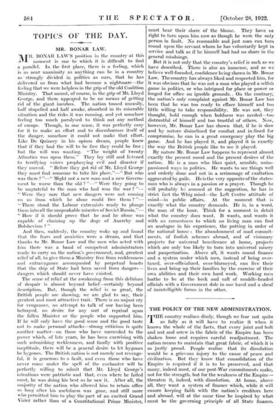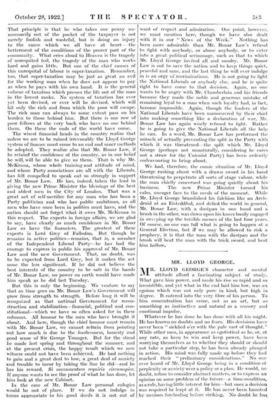THE POLICY OF THE NEW ADMINISTRATION. T HE country realizes dimly,
though we fear not quite as fully as it will have to realize it when it knows the whole of- the facts, that every joint and bolt and nut and screw in the fabric of the Empire has been shaken loose and requires careful readjustment. The nation means to maintain that great fabric, of which it is so justly proud. People realize that its dissolution would be a grievous injury to the cause of peace and civilization. But they know that consolidation of the Empire is required if it is to be preserved, and that many, indeed most, of our post-War commitments make, not for the strength, but for the weakness of the Empire— threaten it, indeed, with dissolution. At home, above all, they want a system of finance which, while it will ensure keeping faith with the nation's creditors here and abroad, will at the same time be inspired by what must be the governing principle of all State finance. That principle is that he who takes one penny un- necessarily out of the pocket of the taxpayer is not merely foolish and wasteful, but is doing an injury to the cause which we all have at heart — the betterment of the conditions of the poorer part of the community. What cries aloud to Heaven is the tragedy of unrequited toil, the tragedy of the man who works hard and gains little. But one of the chief causes of this unrequital of labour is super-taxation. Remember, too, that super-taxation may be just as great an evil for the working man when he does not appear to pay as when he pays with his own hand. It is the general volume of taxation which presses the life out of the man in the lowest ranks. No system of taxation has ever yet been devised, or ever will be devised, which will hit only the rich and from which the poor will escape. The rich man can always to some extent pass on his burden to those behind him. But there is one row of poor fellows at the very back who have no one behind them. On these the ends of the world have come.
The wisest financial heads in the country realize that unless we are to be ruined irrevocably the Lloyd George system of finance must come to an end and saner methods be adopted. They realize also that Mr. Bonar Law, if he retains the confidence of the country, as in our belief he will, will be able to give us them. That is why Mr. McKenna, whose whole training and attitude of mind, and whose Party associations are all with the Liberals, has felt compelled to speak out so strongly in support of Mr. Bonar Law. He has, indeed, taken the lead in giving the new Prime Minister the blessings of the best and ablest men in the City of London. That was a great act of self-sacrifice for any man who has been a Party politician and who has public ambitions, as all men who have once been in politics must have, and the nation should not forget what it owes Mr. McKenna in this respect. The experts in foreign affairs, we are glad to say, have clearly as much confidence in Mr. Bonar Law as have the financiers. The greatest of these experts is Lord Grey of Fallodon. But though he remains in active politics—remains, that is, a member of the Independent Liberal Party—he has had the courage to express in public his approval of Mr. Bonar Law and the new Government. That, no doubt, was to be expected from Lord Grey, but it makes the act none the less significant. If he did not believe the best interests of the country to be safe in the hands of Mr. Bonar Law, no power on earth would have made him speak as he did last Tuesday.
But this is only the beginning. We venture to say that as time goes on Mr. Bonar Law's Government will grow from strength to strength. Before long it will be recognized as that national Government for recon- struction and stabilization—financial, political and con- stitutional—which we have so often asked for in these columns. All honour to the men who have brought it about. And here, though the chief honour must remain with Mr. Bonar Law, we cannot refrain from pointing out how much is due to the fearlessness, honesty and good sense of Sir George Younger. But for the stand he made last spring and throughout the summer, and at the present crisis, the happy result which we now witness could not have been achieved. He had nothing to gain and a great deal to lose, a great deal of anxiety and trouble to incur by taking the line he did—and he has his reward. Si mo;iumentunt requiris circumspice. If anyone wants to see the proof of what he has done, let him look at the new Cabinet.
In the case of Mr. Bonar Law personal eulogies would be out of place. If we do not indulge in terms appropriate to his good deeds it is not out of want of respect and admiration. One point, however, we must mention here, though we have also dealt with it in our " News of the Week." Nothing has been more admirable than Mr. Bonar Law's refusal to fight with anybody, or abuse anybody, or to enter into a great political scrimmage, such as that to which Mr. Lloyd George invited all and sundry. Mr. Dollar Law is out to save the nation and to keep things quiet, peaceful and sane, and the last thing he will ever indulge in is an orgy of recriminations. He is not going to fight the National Liberals or anybody else, and he is quite right to have come to that decision. Again, no one wants to be angry with Mr. Chamberlain and his friends because they made the noble and generous mistake of remaining loyal to a man when such loyalty had, in fact, become impossible. Again, though the leaders of the National Liberals have been manoeuvred by their chief into making something like a declaration of war, Mr. Bonar Law has again wisely refused to fight. Rather he is going to give the National Liberals all the help he can. In a word, Mr. Bonar Law has performed the miracle of actually preventing the split in the Party with which it was threatened—the split which Mr. Lloyd George (perhaps not unnaturally, considering he cares not a straw for the Unionist Party) has been ardently endeavouring to bring about.
We had, therefore, the comic situation of Mr. Lloyd George rushing about with a drawn sword in his hand threatening to perpetrate all sorts of stage valour, while the man chiefly concerned was going quietly about his business. The new Prime Minister turned his calm, uneager face to the needs of the moment. While Mr. Lloyd George brandished his falchion like an Arch- druid at an Eisteddfod, and defied the world in general, Mr. Bonar Law, with a dustpan in one hand and a brush in the other, was down upon his knees busily engaged in sweeping up the terrible messes of the last four years. Of course, no one can tell what is going to happen at a General Election, but if we may be allowed to risk a prophecy, it is that the man with the dustpan and the brush will beat the man with the trick sword, and beat him hollow.











































 Previous page
Previous page